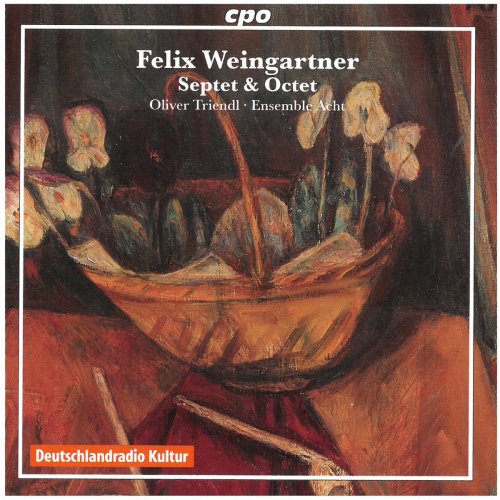
Oliver Triendl - Weingartner: Septet in E Minor, Op. 33 & Octet in G Major, Op. 73 (2007)
BAND/ARTIST: Oliver Triendl
- Title: Weingartner: Septet in E Minor, Op. 33 & Octet in G Major, Op. 73
- Year Of Release: 2007
- Label: CPO
- Genre: Classical
- Quality: FLAC (tracks)
- Total Time: 76:39 min
- Total Size: 282 MB
- WebSite: Album Preview
Tracklist:
01. Septet in E Minor, Op. 33: I. Allegretto appassionato
02. Septet in E Minor, Op. 33: II. Allegretto
03. Septet in E Minor, Op. 33: III. Adagio. In carattere d'una improvisazione, ma in tempo
04. Septet in E Minor, Op. 33: IV. Danza funebre
05. Octet in G Major, Op. 73: I. Allegro
06. Octet in G Major, Op. 73: II. Andante
07. Octet in G Major, Op. 73: III. Tempo di menuetto
08. Octet in G Major, Op. 73: IV. Allegro moderato
01. Septet in E Minor, Op. 33: I. Allegretto appassionato
02. Septet in E Minor, Op. 33: II. Allegretto
03. Septet in E Minor, Op. 33: III. Adagio. In carattere d'una improvisazione, ma in tempo
04. Septet in E Minor, Op. 33: IV. Danza funebre
05. Octet in G Major, Op. 73: I. Allegro
06. Octet in G Major, Op. 73: II. Andante
07. Octet in G Major, Op. 73: III. Tempo di menuetto
08. Octet in G Major, Op. 73: IV. Allegro moderato
Felix Weingartner (1863-1942) needs little introduction as a legendary conductor, but few realize how seriously he pursued composition, writing six symphonies, five string quartets, and innumerable songs. I echo other reviewers here in their emphatic praise of these two chamber works, each bearing the mark of late German Romanticism, namely Brahms, Wagner, and Bruckner.
The gloomy Piano Sextet in E minor (1906) is the greatest of its kind I’ve ever heard, eclipsing the sextets of Lyapunov, Glinka, and even Mendelssohn. Every movement is instilled with strong ideas and memorable content. It opens with an intense “Allegro appassionato” possessing magisterial themes: the first is heroic and striving; the second conveys soaring hope and profundity. Both themes are rich in melodic content. A lighter mood pervades the “Allegretto” with its playful pizzicato melody—so charming and tuneful—and a trio of aching beauty. Things turn sober in the pensive “Adagio,” notable for its gravity and profound harmonic progressions outlined by the piano. Weingartner foregoes the usual spirited finale for an intense “Danza funebre,” a stylized funeral march full of anguish and emotional pangs.
Nearly twenty years later Weingartner would embark on another rarefied chamber genre with his Octet in G major (1925). Despite its major key, the opening “Allegro” is serious, chromatic, and swells with Brucknerian grandeur. Owing to the confident and active piano part, the texture is befitting of a concerto. Wagner would have been pleased by the melodious primary theme, which another reviewer compared to the Liebestod. After some throat clearing, the melancholy “Andante” becomes a passionate outcry of grief, tempered by meditative respites. At this juncture the piece brightens. The “Tempo di minuetto” is coolly relaxed with a warm theme for the solo horn, while the finale is energetic and features an updated palette of whole tones and modern harmony.
Performances and recorded sound are top-notch, as one can expect from CPO. Oliver Triendl is always outstanding and employs tremendous muscle and vigor.
Bottom line: Weingartner’s Sextet is a magnificent full-blooded work of serious expression and drama, brimming with memorable moments that encourage repeated hearings.
The gloomy Piano Sextet in E minor (1906) is the greatest of its kind I’ve ever heard, eclipsing the sextets of Lyapunov, Glinka, and even Mendelssohn. Every movement is instilled with strong ideas and memorable content. It opens with an intense “Allegro appassionato” possessing magisterial themes: the first is heroic and striving; the second conveys soaring hope and profundity. Both themes are rich in melodic content. A lighter mood pervades the “Allegretto” with its playful pizzicato melody—so charming and tuneful—and a trio of aching beauty. Things turn sober in the pensive “Adagio,” notable for its gravity and profound harmonic progressions outlined by the piano. Weingartner foregoes the usual spirited finale for an intense “Danza funebre,” a stylized funeral march full of anguish and emotional pangs.
Nearly twenty years later Weingartner would embark on another rarefied chamber genre with his Octet in G major (1925). Despite its major key, the opening “Allegro” is serious, chromatic, and swells with Brucknerian grandeur. Owing to the confident and active piano part, the texture is befitting of a concerto. Wagner would have been pleased by the melodious primary theme, which another reviewer compared to the Liebestod. After some throat clearing, the melancholy “Andante” becomes a passionate outcry of grief, tempered by meditative respites. At this juncture the piece brightens. The “Tempo di minuetto” is coolly relaxed with a warm theme for the solo horn, while the finale is energetic and features an updated palette of whole tones and modern harmony.
Performances and recorded sound are top-notch, as one can expect from CPO. Oliver Triendl is always outstanding and employs tremendous muscle and vigor.
Bottom line: Weingartner’s Sextet is a magnificent full-blooded work of serious expression and drama, brimming with memorable moments that encourage repeated hearings.
As a ISRA.CLOUD's PREMIUM member you will have the following benefits:
- Unlimited high speed downloads
- Download directly without waiting time
- Unlimited parallel downloads
- Support for download accelerators
- No advertising
- Resume broken downloads


